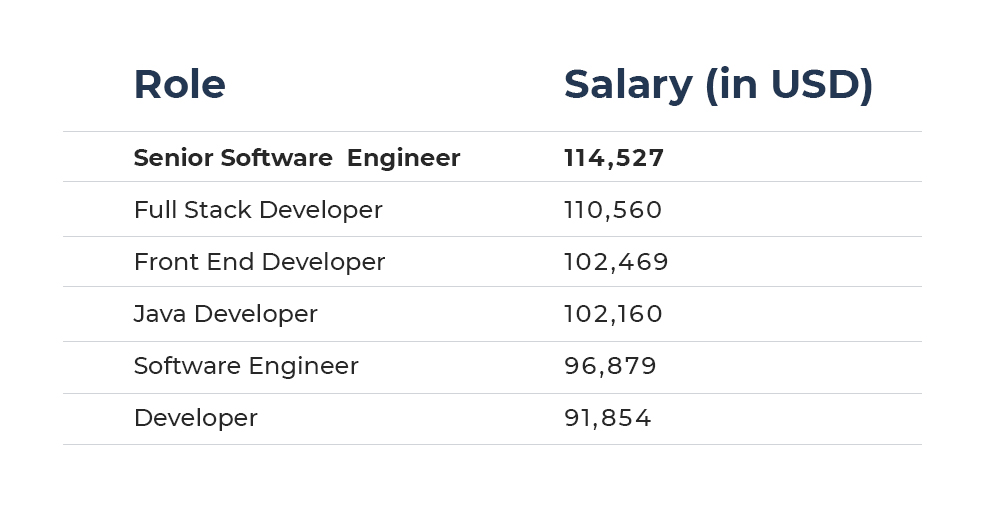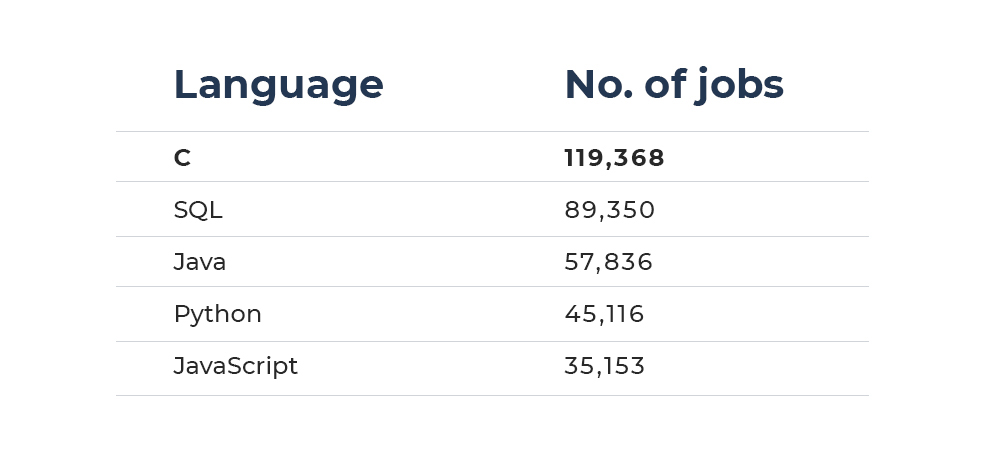You’re thinking of becoming a developer, but what can you expect after you’ve finished a coding bootcamp? We’ll give you the lowdown on the good and the ugly, the pros and the cons of programming. Read on to find out more.
Becoming a Developer: The Pros
1. Salary
Developers earn very good salaries. According to PayScale, a developer can earn an average annual salary in the US of $102,592 (Glassdoor pegs it at $115 000). In addition, the 2018 State of IT report states that 87% of companies expect their technology budgets to get larger or stay the same next year. That’s great news for salaries.
Here’s a list of the six top jobs and their corresponding salaries, via Indeed.com:

Image Source: https://www.c-sharpcorner.com/article/top-software-job-trends-in-2018/
2. Demand
According to the US Bureau of Labor Statistics, software developer jobs are predicted to grow by 17% from 2014 to 2024. This is much faster than the average for other occupations, which is at 7%. The US Bureau of Labor Statistics explains that the main reason for the rapid growth is due to ‘a large increase in the demand for computer software’.
Here’s a table containing the number of jobs available for the the top 5 programming languages, via Indeed.com.

Image Source: https://www.c-sharpcorner.com/article/top-software-job-trends-in-2018/
3. Never Too Late to Become a Developer
You might think that programmers are all youngsters who have been coding away since elementary school, but that’s not true. According to the 2018 Stack Overflow Developer report, which surveyed over 100 000 developers, 25% of programmers are over the age of 35.

In addition, a full third of professional developers on Stack Overflow only learned to code within the past five years, so presumably a fair number of those older developers probably learnt coding fairly recently. In fact, almost 12% of developers who work in the industry only learnt to code in the past two years. Becoming a developer can happen at any age!
4. You Can Freelance
Not only can you work from anywhere – the beach, the local coffee shop, your home – but the average freelance salary is even higher than a permanent salary: According to Glassdoor, you can expect to earn an average freelancer salary of $104,463 per annum in the United States. Enjoy the benefits of the freelance lifestyle: choose projects, clients and technologies that interest you, flexible work schedules and no boss!
5. A Combination of Team and Individual Work
T-shaped employees are often an ideal developer hire, says Stack Overflow, based on interviews with CEOs, programmers, and recruiters. According to TechTarget, a T-shaped employee refers to a person who has ‘a breadth of general knowledge and soft skills’ – this is represented by the horizontal bar of the T. The hard skills part is symbolised by the vertical part. Basically, a T-shaped individual is both a generalist (with people skills), as well as someone who has niche-topic specialities. This person is best, because many tech jobs involve a combination of team and individual work.
What about the cons of becoming a developer? Let’s look at a few of those.
Becoming a Developer: The Cons
1. Competition
Because the salary and the job conditions are good – so good, in fact, that Software Engineering was seen as the ‘best STEM job’ and ‘best Technology job’, according to the U.S. News & World Report – there will be competition for jobs. However, as mentioned, job demand is high. To separate yourself from the rest, consider completing an online coding bootcamp, which will broaden your skill set by learning more programming languages and technologies.
2. Too Much Sitting
This might not sound like a con, but it is. Business Insider reports that a sedentary lifestyle is not only bad for the heart and the waistline, but also increases the risk for cancer and diabetes. You can counteract this con by taking frequent breaks and working exercise into your schedule.
3. You’re Always Learning
This can be stressful for some people, because there’s always more to know, and different ways of doing things. Says Stack Overflow: ‘Developers are lifelong learners; almost 90% of all developers say they have taught themselves a new language, framework, or tool outside of their formal education. Among professional developers, almost half say they have taken an online course like a MOOC, and about a quarter have participated in a hackathon.’
4. Stress
It’s well-known that coding can be stressful. Says Nasreen Mahomed, a Junior Software Developer: ‘Like most jobs, the stress waxes and wanes. Live pushes are certainly pressurised times. If there are problems, you need to keep a cool head and fix it quickly. You have to be able to work well under pressure.’
5. The Hours Can Be Long
There are times when you’re rolling out a project and you’ll be required to work weekends or overtime. Also, if you run into problems and a system goes down, you may be expected to work extra time. However, if you enjoy the work, this shouldn’t be too much of a sacrifice.
In this article we’ve listed the pros and cons of becoming a developer. It certainly seems that the pros – including high salaries, potential freelance work and increasing demand – outweigh the cons. If you’re needing to learn how to code or update your coding knowledge, consider signing up for one of HyperionDev’s six-month, part-time online coding bootcamps in Full Stack Web Development, Mobile Development and Software Engineering.


